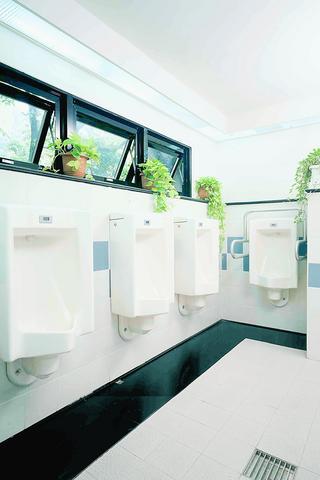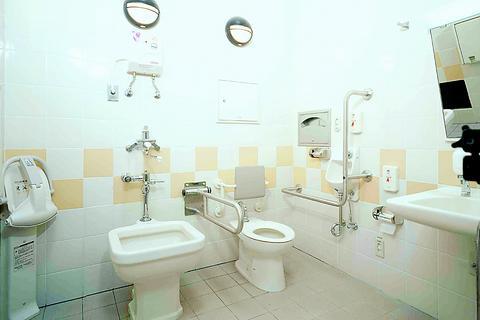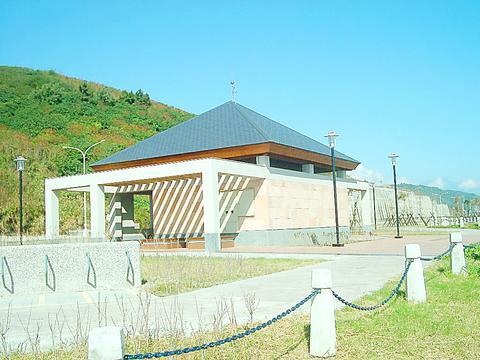Many tourists to famous tourist areas in Taiwan are impressed by the country's mountains and forests, lakes and beaches. But public toilets next to these delightful sightseeing spots are all too often unremarkable, or when they are remarkable, it's for their puddled floors and stinking stools.
At the three-day annual World Toilet Summit last week, hosted for the first time by the Taiwan Toilet Association (
"If the government wants to double the number of tourists to Taiwan, public toilets are the key, otherwise we'll see the number not doubled but halved," said Cheng Cheng-li (

PHOTO COURTESY OF YOU MING-GUO
Domestic travel reportage in the local media almost never mentioned toilets until recently, when Liao Wei-li's (
"Most people do not like to talk about toilets. Traditionally, it's not a decent subject, but we have to talk about it to know how to improve toilet designs," Cheng said -- and to improve toilets is first of all to make them clean.
"In tourist areas, public toilets leave a significant impression on tourists. However, the existing toilets are mostly not clean and odorless. Tourists go there only when they have no choice and rush out as quickly as possible. The most important thing at present is to have clean toilets."

The exterior of the toilets comes next. "The success of a toilet design does not rely on its appearance. When tourists actually use the facilities, they don't look at how pretty the exterior is. Their concern is more about whether it's bright enough or does it look safe," Cheng said.
Cheng cited Singapore's "Happy Toilet Program," a rating system imposed on all public toilets, to improve them. Taipei City Government currently runs a similar rating system, but its enforcement has not been tough enough.
"Sometimes, after a toilet wins the `smiling face mark' ... for its cleanliness, maintenance lapses after the government officials leave," Cheng said.

Wu, president of the Taiwan Toilet Association, made slight changes in regular toilets settings with his designs for three restroom buildings in Yangminshan Park to make maintenance easier. In the men's room, a row of windows is placed at eye level above the stools.
"Out of the window, you can see trees and flowers. People are naturally drawn to things outside the window, so that the urinating men will stand closer to the stool in order to look out at the trees. In doing so, they unknowingly come closer to the stool and therefore their urine does not drip outside. This then keeps the floor dry and easier to clean," Wu said.
The three newly-finished toilets are known for being "human friendly." They are fitted out with a variety of accessories for the family and handicapped users. Such toilets that everyone can use with ease are necessary for tourist spots, Wu said.
"If you really want to attract people to tourist areas, you need designs for the handicapped, so that they can enjoy outdoor activities like everyone else. Handicapped people are often discouraged from going sightseeing by the troublesome business of going to toilets."
Through a Japanese architect friend, who lost both legs in a car accident, Wu got to know the specific needs of wheelchair-bound people and used that knowledge in his designs.
"Toilets for wheelchair users are equipped with a pair of bars which users can hold onto when they remove their pants and sit on the stool, but the bars are often set either too close or too far apart, so handicapped users have to make a lot of effort to undress," Wu said. In order to solve the problem, Wu installed bars which are 70cm apart in the 2.2m by 2.2m "multifunctional toilets" on Yangmingshan. The wash stand is within arm's reach from the stool on one side. "Wheelchair users often have constipation because they sit all the time, so they have to use an enema, or even their fingers. The wash stand have to be within easy reach so they can wash their hands right after the procedure," Wu explained.
On the other side stands a disposal basin with a warm water outlet, for cleaning an artificial anus, or bladder, and the accompanying sanitary bags.
"The dining habits of people in Taiwan are not very healthy, so a large number of people developed illnesses and have an artificial anus. They are forced to stay home because they have to take care of the device from time to time. If the toilets allow them to perform these routines easily, they would be free to come outside to enjoy nature like healthy people."
You Ming Guo (
"Toilets in tourist areas can be more than toilets. They can be another idyllic spot where tourists rest their feet. At present, these toilets are stinky and dirty. Tourists want to stay as far away from them as possible," You said.
To change people's attitudes, You designed large window for ventilation and lighting, to get rid of odors. He also moved the wash stands, usually placed at the entrance, on the outside to prevent people crossing the entrance from stepping on a wet floor.
"Tourists want to use toilets which are as clean as those in their own house," You said.
You's design in Yanliao connects the toilet proper to a wooden arbor, where a bird's eye view of the surrounding hills is clear, to draw people closer to the its surrounding.
As the general consultant on scenery for the Interior Ministry's Construction and Planning Agency (
He suggested localizing tourist-area toilets.
"If the toilets are in Hualien, they can use the famous local marbles, if they are in a forest, they can use local timber. But 99 percent of the toilets look out of place with nature."
You attributed the uniformly staid toilet designs to the fact that architects do not gain as much recognition from designing toilets as from designing, say, shopping malls. Few architects in Taiwan, therefore, specialize in toilets.
To prepare for the 2008 Doubling of Tourists Arrival Plan, You agreed with Cheng that tourist-area toilets have to be clean first.
"They don't have to be like five-star hotels, they just need to be clean. They are part of the first impressions that tourists have of this country. They could even decide whether tourists consider Taiwan a civilized society," You said.

Big changes are afoot in global politics, which that are having a big impact on the global order, look set to continue and have the potential to completely reshape it. In my previous column we examined the three macro megatrends impacting the entire planet: Technology, demographics and climate. Below are international trends that are social, political, geopolitical and economic. While there will be some impact on Taiwan from all four, it is likely the first two will be minor, but the second two will likely change the course of Taiwan’s history. The re-election of Donald Trump as president of the US

The Mountains to Sea National Greenway (山海圳國家綠道) draws its name from the idea that each hiker starting at the summit of Jade Mountain (玉山) and following the trail to the coast is like a single raindrop. Together, many raindrops form life and prosperity-bringing waterways. Replicating a raindrop’s journey holds poetic beauty, but all hikers know that climbing is infinitely more appealing, and so this installment picks up where the last one left off — heading inland and uphill along the 49.8-kilometer Canal Trail (大圳之路) — second of the Greenway’s four sections. A detailed map of the trail can be found

“Bro, I can’t wait for my first dead body,” wrote an 11-year-old boy on Instagram in Sweden, where gangs recruit children too young to be prosecuted as contract killers on chat apps. “Stay motivated, it’ll come,” answered his 19-year-old contact. He went on to offer the child 150,000 kronor (US$13,680) to carry out a murder, as well as clothes and transport to the scene of the crime, according to a police investigation of the exchange last year in the western province of Varmland. In this case, four men aged 18 to 20 are accused of recruiting four minors aged 11 to 17

Feces, vomit and fossilized food from inside stomachs have provided new clues into how dinosaurs rose to dominate Earth, a new study revealed on Wednesday. Scientists have discovered plenty about dinosaurs — particularly about how they vanished off the face of the planet 66 millions years ago. But “we know very little about their rise,” said Martin Qvarnstrom, a researcher at Sweden’s Uppsala University and the study’s lead author. Dinosaurs first appeared at least 230 million years ago, fossils have shown. But they would not become the world’s dominant animal until the start of the Jurassic Period some 30 million years later. What caused this